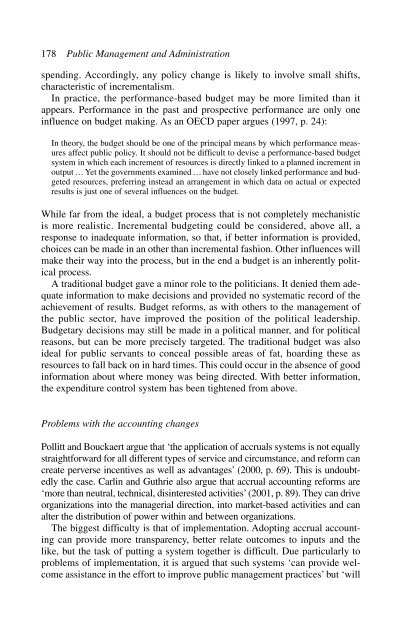Public Management and Administration - Owen E.hughes
Public Management and Administration - Owen E.hughes
Public Management and Administration - Owen E.hughes
Create successful ePaper yourself
Turn your PDF publications into a flip-book with our unique Google optimized e-Paper software.
178 <strong>Public</strong> <strong>Management</strong> <strong>and</strong> <strong>Administration</strong><br />
spending. Accordingly, any policy change is likely to involve small shifts,<br />
characteristic of incrementalism.<br />
In practice, the performance-based budget may be more limited than it<br />
appears. Performance in the past <strong>and</strong> prospective performance are only one<br />
influence on budget making. As an OECD paper argues (1997, p. 24):<br />
In theory, the budget should be one of the principal means by which performance measures<br />
affect public policy. It should not be difficult to devise a performance-based budget<br />
system in which each increment of resources is directly linked to a planned increment in<br />
output … Yet the governments examined … have not closely linked performance <strong>and</strong> budgeted<br />
resources, preferring instead an arrangement in which data on actual or expected<br />
results is just one of several influences on the budget.<br />
While far from the ideal, a budget process that is not completely mechanistic<br />
is more realistic. Incremental budgeting could be considered, above all, a<br />
response to inadequate information, so that, if better information is provided,<br />
choices can be made in an other than incremental fashion. Other influences will<br />
make their way into the process, but in the end a budget is an inherently political<br />
process.<br />
A traditional budget gave a minor role to the politicians. It denied them adequate<br />
information to make decisions <strong>and</strong> provided no systematic record of the<br />
achievement of results. Budget reforms, as with others to the management of<br />
the public sector, have improved the position of the political leadership.<br />
Budgetary decisions may still be made in a political manner, <strong>and</strong> for political<br />
reasons, but can be more precisely targeted. The traditional budget was also<br />
ideal for public servants to conceal possible areas of fat, hoarding these as<br />
resources to fall back on in hard times. This could occur in the absence of good<br />
information about where money was being directed. With better information,<br />
the expenditure control system has been tightened from above.<br />
Problems with the accounting changes<br />
Pollitt <strong>and</strong> Bouckaert argue that ‘the application of accruals systems is not equally<br />
straightforward for all different types of service <strong>and</strong> circumstance, <strong>and</strong> reform can<br />
create perverse incentives as well as advantages’ (2000, p. 69). This is undoubtedly<br />
the case. Carlin <strong>and</strong> Guthrie also argue that accrual accounting reforms are<br />
‘more than neutral, technical, disinterested activities’ (2001, p. 89). They can drive<br />
organizations into the managerial direction, into market-based activities <strong>and</strong> can<br />
alter the distribution of power within <strong>and</strong> between organizations.<br />
The biggest difficulty is that of implementation. Adopting accrual accounting<br />
can provide more transparency, better relate outcomes to inputs <strong>and</strong> the<br />
like, but the task of putting a system together is difficult. Due particularly to<br />
problems of implementation, it is argued that such systems ‘can provide welcome<br />
assistance in the effort to improve public management practices’ but ‘will











